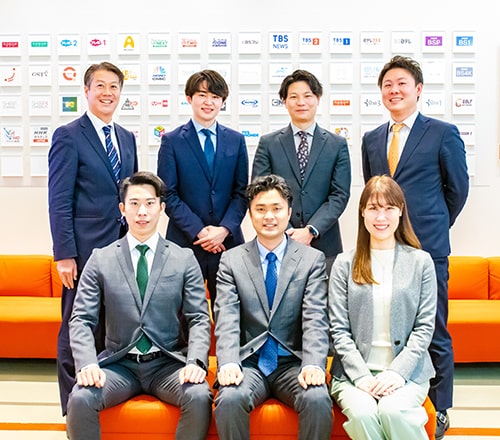Support for Shoreikai and creation of the “J:COM Award”
Supporting young people who will lead the Japanese shogi world
J:COM makes a donation every year so that it can be used for the operation of Shoreikai player training organization within the Japan Shogi Association. We are the first company to support Shoreikai. In addition, the "J:COM Award" will be presented as an item that can be used to praise the dedication and efforts of those who are newly promoted to 4th dan, and can support their success as a shogi player. We presented a suit tailoring ticket in 2021, hoping that you will wear it at the next big game.
The "J:COM Award" will be presented mainly at the venue of the "J:COM Cup March Comes In like a Lion Children's Shogi Tournament" in the hope that it will become a target for children participating in the tournament. .
Normally, 4 students from Shoreikai become professional shogi players each year, and in principle, the age limit is 26 years old. J:COM will continue to support young people who are single-mindedly working toward the narrow gate of becoming a professional shogi player.
Reference: August 3, 2021 News Release (309KB)
- ※Titles omitted
| Award year | Shoreikai 3rd Dan League | New 4th Dan Promoter | |
|---|---|---|---|
| 2023 | 73rd | Kenta Miyajima | Hirotoshi Ueno |
| 72nd | Naoki Koyama | Morimoto Saito | |
| Kanta Sagi | ー | ||
| Shogi player transfer exam | Leo Koyama | ||
| 2022 | 71st | Nagisa Fujimoto | Yuuya Saito |
| 70th | Leo Okabe | Tokuda Kenshi | |
| 2021 | 69th | Yuki Yokoyama | Mikio Kariyama |
| 68th | Akihiro Ida | Akihiro Takada | |
2023 presentation ceremony
Kenta Miyajima 4th Dan
(2023/11/19 Shogi Day in Kansai)
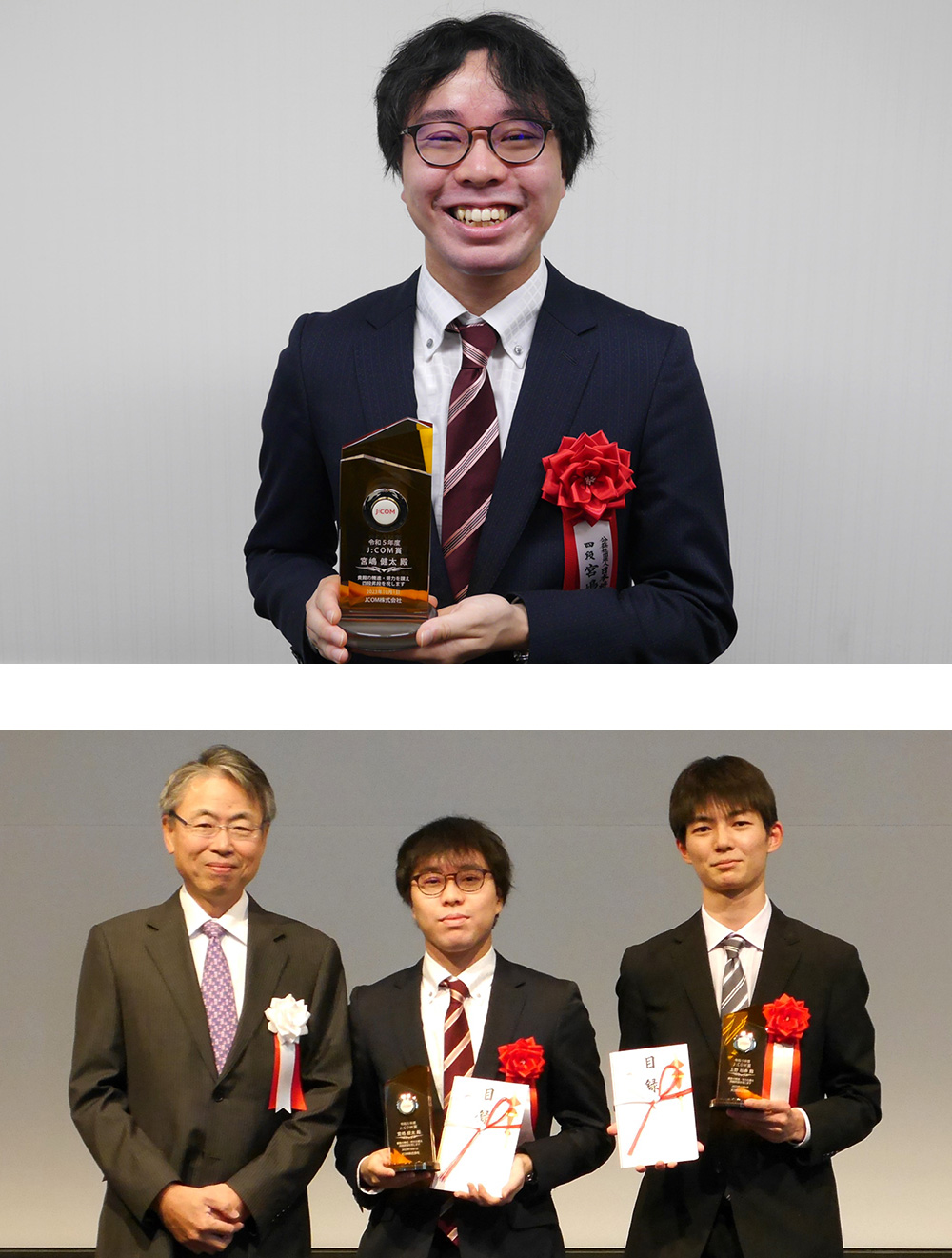
From left: J:COM Taguchi, Kenta Miyajima 4th Dan, Hirotoshi Ueno 4th Dan
Award comment
I started playing shogi when I was 6 years old. I first learned it from my grandfather. My parents enthusiastically supported me by allowing me to attend children's classes 5 days a week, researching competitions, etc. I also became a member of Gifu Prefecture's Elementary School Masters and advanced to the national competition, but at the time I was most happy to win and to have the opportunity to compete against the strong players.
I remember feeling very jealous when I learned that the J:COM Cup started just the year after I joined Shoreikai. At that time, there weren't many events where you could go from a local tournament to a national tournament, so I felt it was a good opportunity to compete against strong opponents.
Regarding the J:COM Award, as I was competing in Shoreikai, I heard about the existence of such an award from my close friends, Mr. Maki and Mr. Saito, and I thought that if you become a 4th dan, something like this could happen. That was one of my motivations.
The most difficult time for me was when I was stagnant at Shodan for about 3 years and 10 months. I was passed by my peers, and even by younger players such as Fujii Hakkan, and it was very difficult for me to see my growth.
I feel that what enabled us to overcome such a period was the introduction of AI research. Perhaps I was suited to AI research, as I was able to move up from 1st dan to 2nd dan, and then to 3rd dan without any wasted stars.
During my time at Shoreikai, I once served as the recorder for the Fujii Hakkan, and I often had the opportunity to listen to him speak after a game in the players' room, and I feel that this experience was useful in the Sandan League as well.
I was starting to think that I might never become a shogi player, and I was also thinking about what I would do after I left the club at the age of 26, so when I became a shogi player, I was more relieved than happy. After being promoted, my desire to move to a higher level has become stronger day by day, and I feel that I have to work even harder from now on.
Up until now, I have been steadily surpassed by others, so from now on I want to surpass those around me. First of all, my immediate goal is to get through the rankings for one period and become 5th dan. I want to make steady progress every day.
In particular, I would like to thank Professor Shingo Sawada for his advice, including from a spiritual standpoint. Sensei Sawada is the organizer of the Tokai training group, has many disciples, puts effort into spreading the word, and is an admired person who is also active at the top. I wish I could be like that too.
I usually take a break by watching sports. I played baseball in elementary school and basketball in junior high school, and I like sports and moving my body. I don't have a lot of opportunities to do it myself these days, but I really like watching Japanese players who are doing well at the top, especially overseas.
As with anything, I think the most important thing is to enjoy shogi. This will affect the quality and the amount of time you can devote yourself to it. For me, it was rare for me to feel like playing shogi was fun during Shoreikai. However, I feel that the reason I have been able to continue playing shogi is because my love for shogi has never changed. Maybe I can say this because I became a shogi player, but I feel lucky to have found something that I'm passionate about.

From left: J:COM Taguchi, Kenta Miyajima 4th Dan, Hirotoshi Ueno 4th Dan
Hirotoshi Ueno 4th Dan
(2023/11/19 Shogi Day in Kansai)
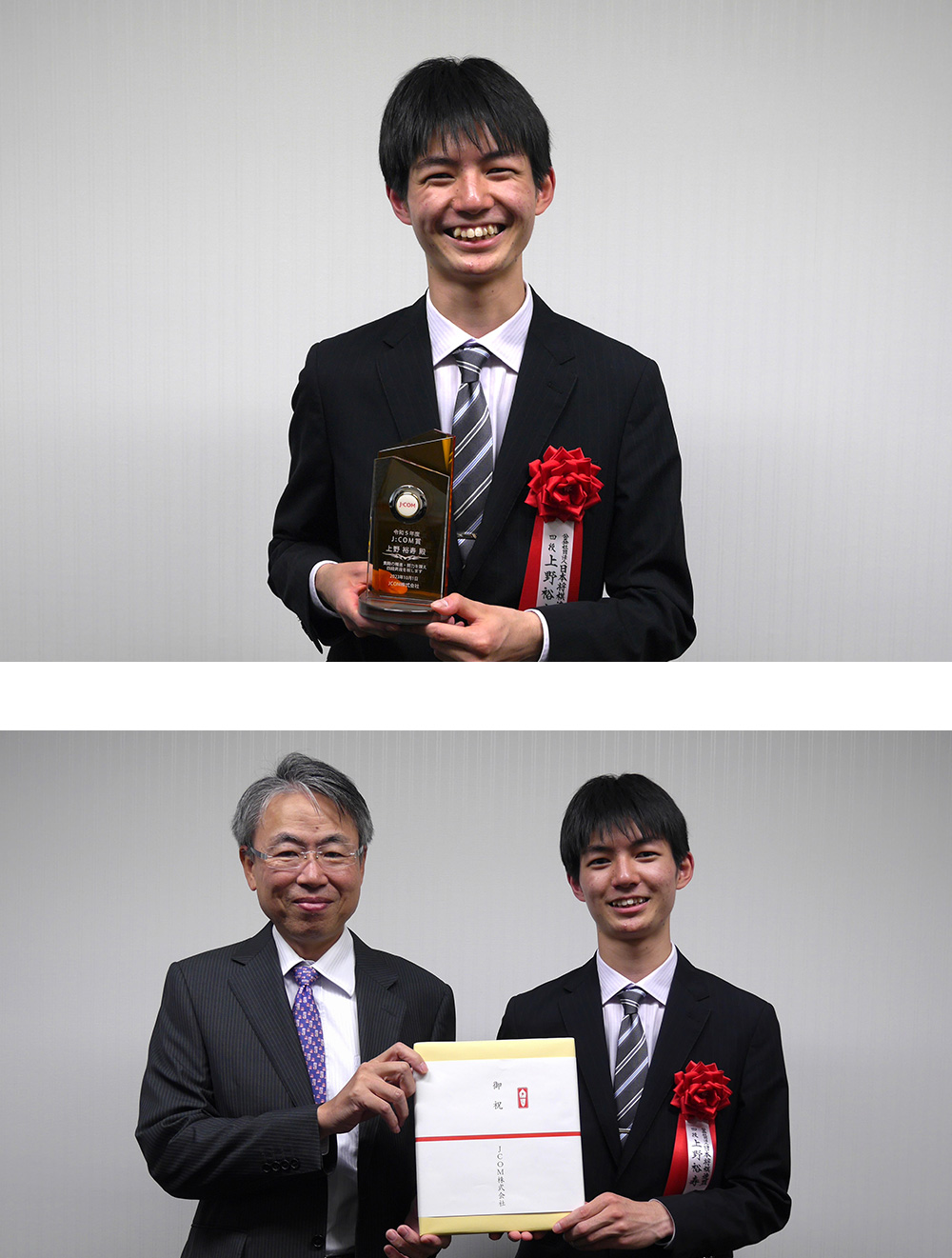
From left: J:COM Taguchi, Hirotoshi Ueno 4th Dan
Award comment
I had heard about the J:COM Award from my seniors who had won it in the past. I've been appearing in public more often, so I'm happy to be able to receive a suit tailoring ticket. I'm also happy to receive pieces. (* Presented to J:COM Cup national tournament participants)
I started playing shogi when I was 5 years old, taught by my father who was a 2nd dan amateur chess player. He started attending the Kakogawa Shogi Club when he was in the first grade of elementary school and continued to improve his skills.
The biggest tournament I participated in when I was a child was in the lower grade division of the Kurashiki Osho Tournament when I was in third grade. After winning the national championship here, I started thinking about becoming a professional athlete.
I remember that I won second place in the 4th J:COM Cup, which I participated in when I was in 6th grade. I think the special feature of J:COM Cup is that both elementary school and junior high school students can participate, but my opponent in the final was my classmate, and even though I thought, ``I don't want to lose to elementary school students,'' I was disappointed that I lost in the end. I remember that.
I joined Shoreikai the month after the tournament and reached 3rd Dan in my third year of junior high school. I thought I would be able to turn professional right away, but I struggled in the third-dan league and it took me five years to get through. That period was difficult.
My hometown, Kakogawa, is known as a shogi player's town, so shogi is also popular. The voices of support there were very encouraging, and I feel that I was able to do my best by following in the example of other players from the Inoue clan.
After graduating from high school and deciding not to go to university and just focus on shogi, I worked hard with the strong feeling that I had no choice but to improve, and I started spending more time studying shogi. I believe that my skills have improved as I have been receiving more lessons from my seniors at the Kansai Shogi Kaikan and participating in more study groups.
The Inoue clan holds research meetings twice a month in Kakogawa. This is a place where Shoreikai mainly participate and work hard together. When someone else was promoted, I felt that I couldn't give up, and it inspired me to follow in the footsteps of Kariyama and Fujimoto.
Even when we weren't getting results in the third-dan league, Mr. Inoue always said to me, ``Ueno-kun, you'll be fine.'' Even though he had many other disciples, he cared for each one of them individually, and I'm grateful for that. I am.
I was able to leave a record as the fastest winner in the Rookie of the Year match, and I feel that this was because I was able to reach the finals as a third-dan.The experience of struggling in the third-dan league was put to good use, and I steadily improved my ability. I accept that this is the result of this.
I've only played in the Rookie of the Year tournament so far, so I want to do well in other shogi tournaments in the future, and I want to do my best to win the title.
I also feel that I want to aim for Professor Sota Fujii. Fujii-sensei is one year older than me, but I feel that he is far away from me. I think it's amazing that you always have a desire to improve.
I will be competing against Fujii-sensei in a commemorative match for winning the Rookie of the Year Championship, so I want to do my best.
My hobby is watching sports. I'm a Hanshin baseball fan and enjoy watching games on TV as a way to relax.
I think the secret to becoming stronger is to play against lots of different people. I think it's good to find a rival close to you, or to challenge someone older than you. I want the children who are playing shogi to try their best to play shogi with various people through various tournaments.

From left: J:COM Taguchi, Hirotoshi Ueno 4th Dan
Kanta Kanta 4-dan
(2023/10/9 Children's Shogi Tournament Tokai Tournament)
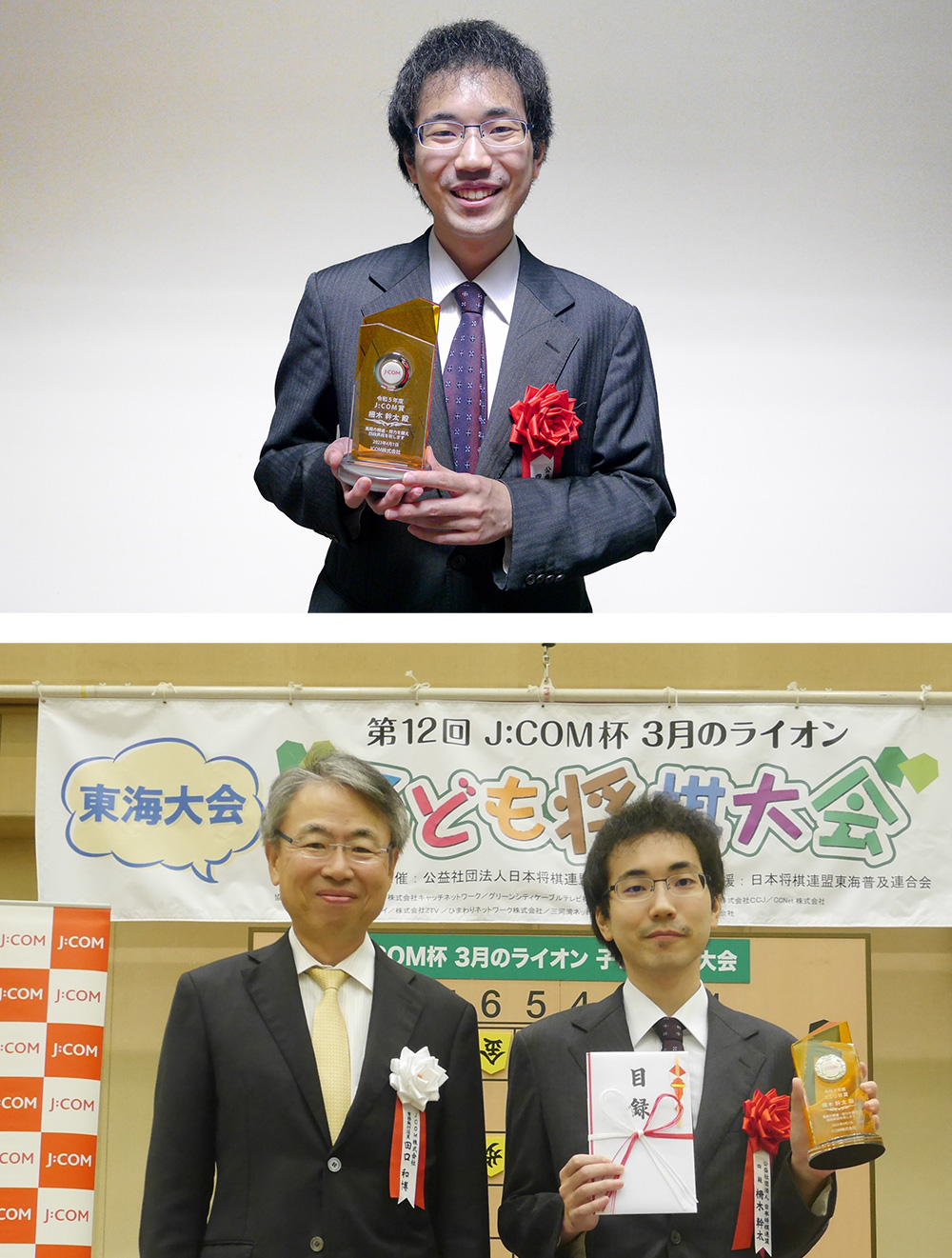
From left: J:COM Taguchi, Kanta Sagi 4-dan
Award comment
My father taught me how to play shogi before I entered elementary school. At first I went to a local dojo, but as I got stronger I started going to classes in Nagoya. One tournament that left an impression on me when I was a kid was the Kurashiki Osho tournament I represented when I was in the 4th to 6th grades of elementary school.I fought against 5th Dan Kuroda and ended up with one win and one loss, but I was pretty disappointed when I lost. Also, when I won the JT Cup, I played against Miyajima 4-dan and it was a heated battle with 186 moves. When I was a child, I competed in tournaments with people who are now professionals, and it left a very strong impression on me.
I joined Shoreikai when I was in the 6th grade of elementary school and have been a member for 13 and a half years overall. It was tough to be demoted from 1st grade to 2nd grade, but 3rd dan was 7 years (14 terms) so I don't remember much about the past. I had my first chance to get promoted in the 11th term, which I took a leave of absence from graduate school, and I was quite shocked when I missed it, but I also felt like I could compete for promotion, and I feel like things started to change from there. . It's not often that you get to play a game where your life depends on it, so I took on the challenge with the intention of having fun.
As the age limit for Shoreikai approaches, I think it becomes harder to talk about promotions, but the people who helped me at the local dojo gathered together and cheered me on, saying, ``I'm always watching,'' which encouraged me, and even when I got promoted. We celebrated. Master Masuda always supported me behind the scenes, telling me, ``It's okay because I'm strong, I'll definitely be able to do well.'' When it came to shogi, he advised me to ``never give up until the end.''
Other than shogi, I like to relax by going to karaoke, reading my favorite manga, and playing Go. When I first learned how to play shogi, I watched the Go/Shogi Channel from morning till night, and even though I was just watching, I was able to play Go as well. I never thought about other occupations because I thought I would definitely get promoted in this life, but if I were to be reborn, I would like to become a researcher or a Go player.
My future goal is to first pass the free class. I'll have a little bit of time left, so I'd like to use that time to build a solid foundation and use it for games starting in the winter. The shogi player I am aiming for is Toyoshima Sensei, whom I respect not only for his style of shogi and the way he approaches it, but also for the fact that he still changes his style even though he is a top shogi player. I'm almost like a fan, so even after I became a shogi player, I was afraid and didn't talk to him much.
When children participate in tournaments, of course they want to win, but even if they lose, I hope they can feel that they had fun playing at least one thing, whether it's a free game or a coached game with a professional shogi player. I think so. I also hope that you can spread the word to your friends.

From left: J:COM Taguchi, Kanta Sagi 4-dan
Saito Morimoto 4th Dan
(2023/8/26 Children's Shogi Tournament Kansai Tournament)
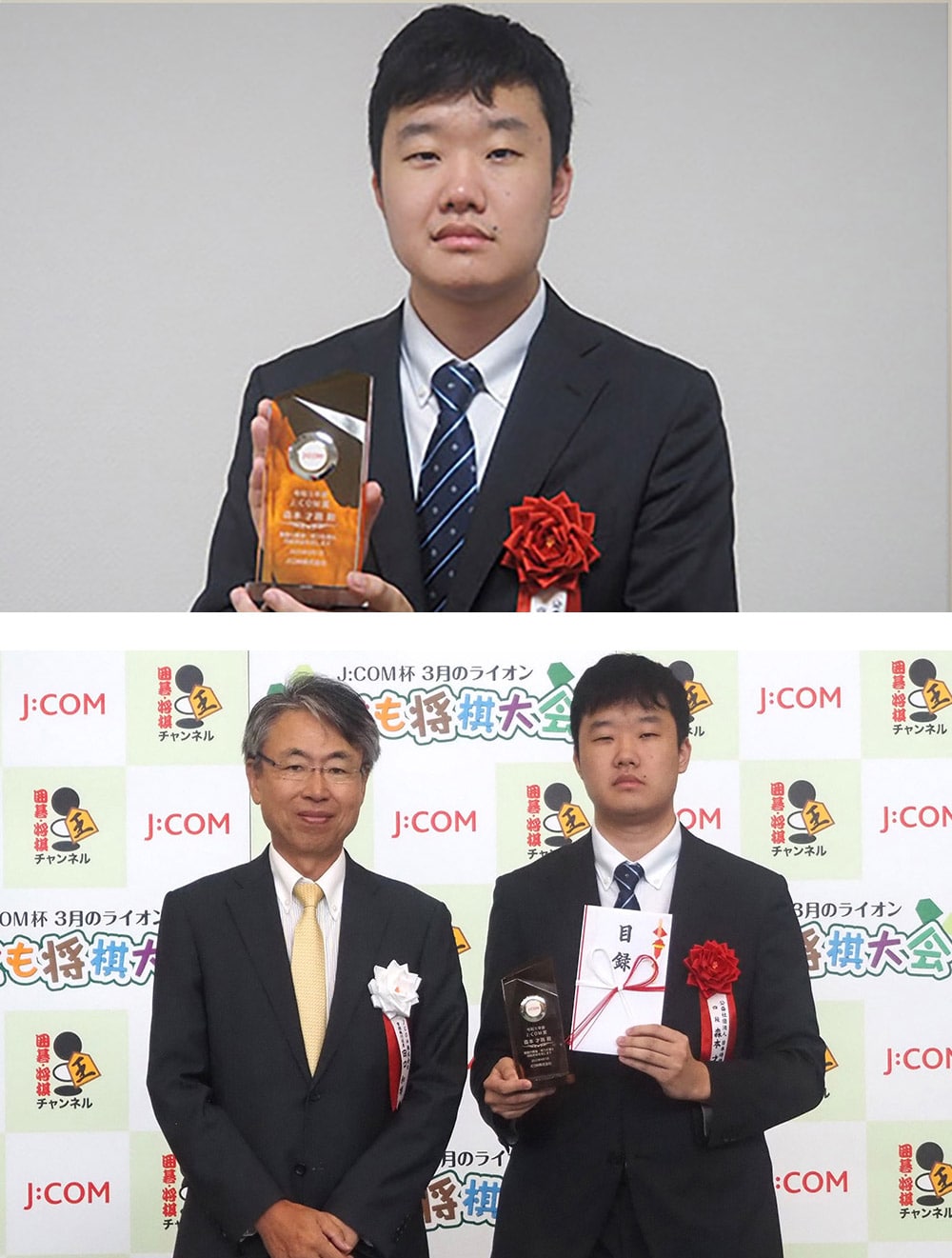
From left: J:COM Taguchi, Morimoto Saijō 4-dan
Award comment
I participated in J:COM Cup when I was in the 5th grade of elementary school, and even though I won the elementary school student title, I lost, and I remember thinking that there were still strong people out there. When I was a child, I had the impression that the elementary school Meijin tournament and the Kurashiki Ohsho tournament were to determine who was the strongest among elementary school students, so it felt special.
I started playing shogi because my father, who loves shogi, told me about it. At first, I used to refer to him as my father, but when I was in elementary school, I started going to the Kansai Shogi Kaikan Shogi class. It was my first lesson, and I started with the idea of trying one thing, so I never thought I would become a professional.
Since I joined Shoreikai when I was in the fifth grade, there were actually three times when I thought about quitting.
The first time was when I stopped at the 3rd class for a year and a half, moved up to the 2nd class and failed in half a year. Sometimes I was overtaken by someone who entered Shoreikai after me. The second time was when I got demoted in the 1st class and managed to erase it, but it was about to come back. And the third time was when I lost twice in a row at 3rd. At that time, my teacher, Kenji Kobayashi, 9th Dan, gave me words of encouragement, saying, "If you give up, you're done." I think I had a big mental problem.
When I was promoted to 4th dan, I received congratulatory messages from my master, fellow shogi players, and friends from high school. Tokuda Kenshi 4th dan told me, ``I thought I was going to win in a row (on the final day of the 3rd dan league)'', so I think I was in the mood to move up to 4th dan.
Other than shogi, I do muscle training at the gym. When I was losing, I tried it for a change of pace, and I was able to win. I also like watching baseball, and because of the influence of my parents who are fans of Hankyu (now Orix), I've been rooting for Orix since I was in the 5th grade of elementary school.
My future ambition is to win 60% of the total for the year. The target person is Mr. Takeshi Fujii of the same rook party. Fujii I think it's amazing that we created a tactic called the system, and even if we put it in the current AI, it will come out as the best move. I think it will be difficult, but I hope someday I can realize something called the Morimoto system.
I want children to have fun playing shogi. Also, I would like you to cherish friendships with people of the same generation.

From left: J:COM Taguchi, Morimoto Saijō 4-dan
Naoki Koyama 4th Dan
(2023/8/12 Children's Shogi Tournament Kanto Tournament)
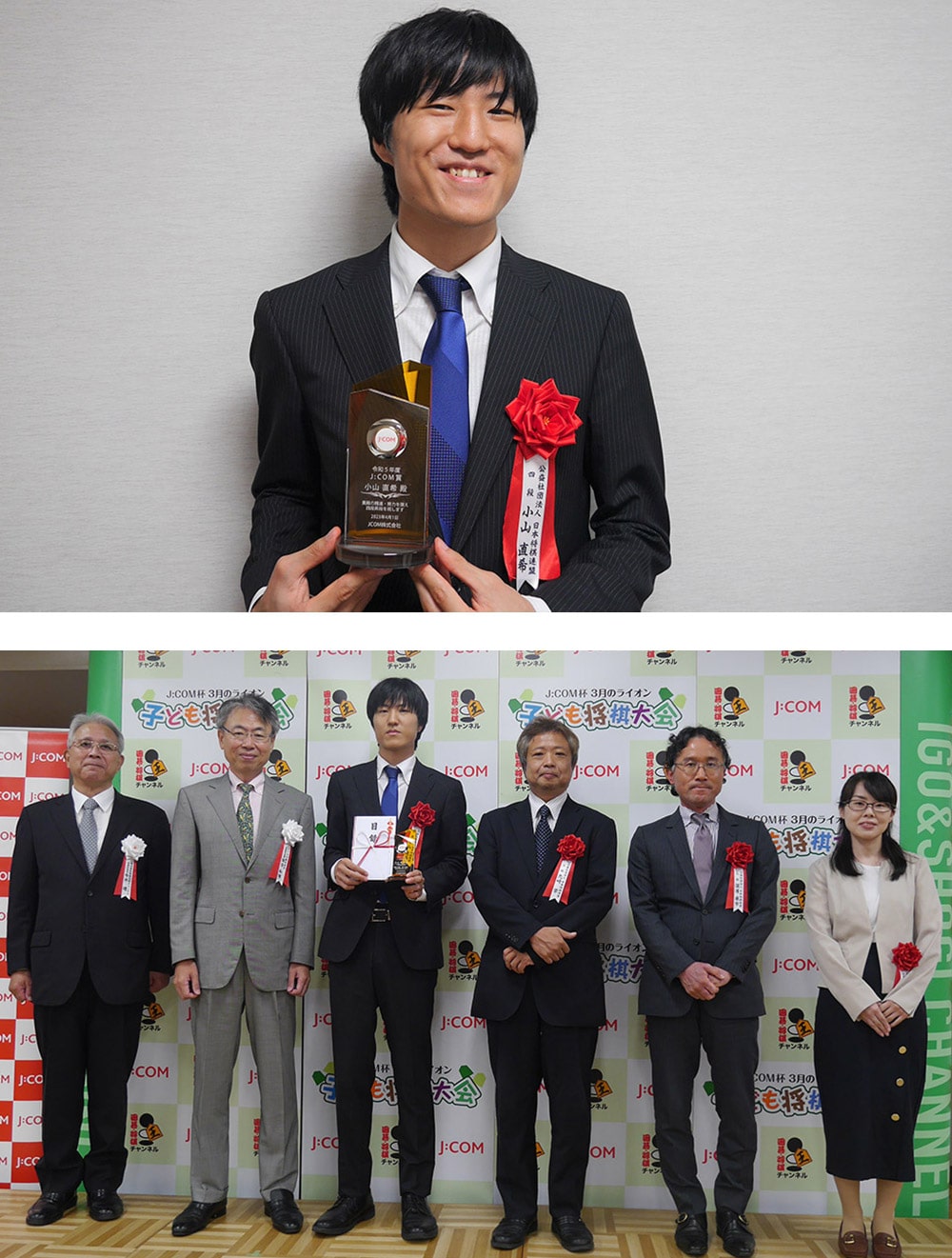
From left: Go/Shogi Channel Mr. Imai, J:COM Taguchi, Naoki Koyama 4th dan, Manabu Senzaki 9th dan, Yasushi Fukaura 9th dan, Teisho Minami Female 2nd dan
Award comment
I learned about the J:COM Award a year ago when Reo Okabe, 4th dan, received the award, and I feel that it was a great honor to receive this award for the new 4th dan. I have known about the existence of shogi since I was in the second and third grades of elementary school, but I became obsessed with it after watching the Ryuo match that was being broadcast on TV in the winter of my fourth year of elementary school. At first, I referred to it as my family, but during my fourth year of elementary school, I often referred to it by setting the AI level on my PC shogi software. I also attended a shogi class, but even after that I often had to play against machines.
Participating in the Elementary School Meijin Tournament when I was in the fifth grade left a lasting impression on me. It was my first and last chance to challenge myself to see if I could be on the Tokyo national team, so I got nervous and used tactics that I wasn't used to, and I ended up losing without much success. I think I was nervous because I felt like I had a lot of ability.
I don't remember having to struggle that much from the time I joined Shoreikai in the first year of junior high school until I got to 3rd dan, but once I started competing against people who could have gone on to become professionals at 3rd dan, I suddenly started to struggle. There was a time when I couldn't win, and I kept thinking about how I could win. I played in the third-dan league for two or three years, but I studied harder than when I was second-dan or below, and I felt like I had improved my ability. Over the past year and a half, I've gained more confidence and am able to win fairly well. I didn't get enough hands-on experience with people due to my work and school schedule, but I think it was also important that I graduated from high school and started going to shogi halls and other places on weekdays to play against people multiple times a week. Masu. Even when I was having a hard time, my family accepted me with the attitude that I could do whatever I wanted, and they always made meals for me and supported me when I was feeling unwell. .
After being promoted to 4th dan, I began to participate in shogi classes taught by Atsuya Iijima, a 5th dan shogi player. It was the first class I went to when I was a child, and I have been taught there ever since, even when I was an amateur. He was my teacher who taught me not only shogi, but also posture and etiquette, and on the day I was promoted to 4th dan, he was as happy as I have ever seen him. They congratulated me, but I was especially impressed by how they encouraged me to work harder because this is the starting line.
My future goals include winning percentage, but I also want to go to a place where I can compete in big games, where I can get clear results, such as making it to the finals of a shogi match or making it through the preliminary rounds.
The person I admire is Kaoru Mitoma, a member of the Japanese national soccer team. There are many other great players, but I respect Mitoma for his hard work, his attitude toward achieving goals, and his commitment to achieving results.
It is important for children to reflect when they lose, but I also want them to analyze why they won when they win. In order to become stronger, I feel that the most important thing is to keep looking back at the shogi you played, and to continue doing so.

From left: Go/Shogi Channel Mr. Imai, J:COM Taguchi, Naoki Koyama 4th dan, Manabu Senzaki 9th dan, Yasushi Fukaura 9th dan, Teisho Minami Female 2nd dan
Leo Koyama 4th Dan
(2023/7/29 Children's Shogi Tournament Tohoku Tournament)
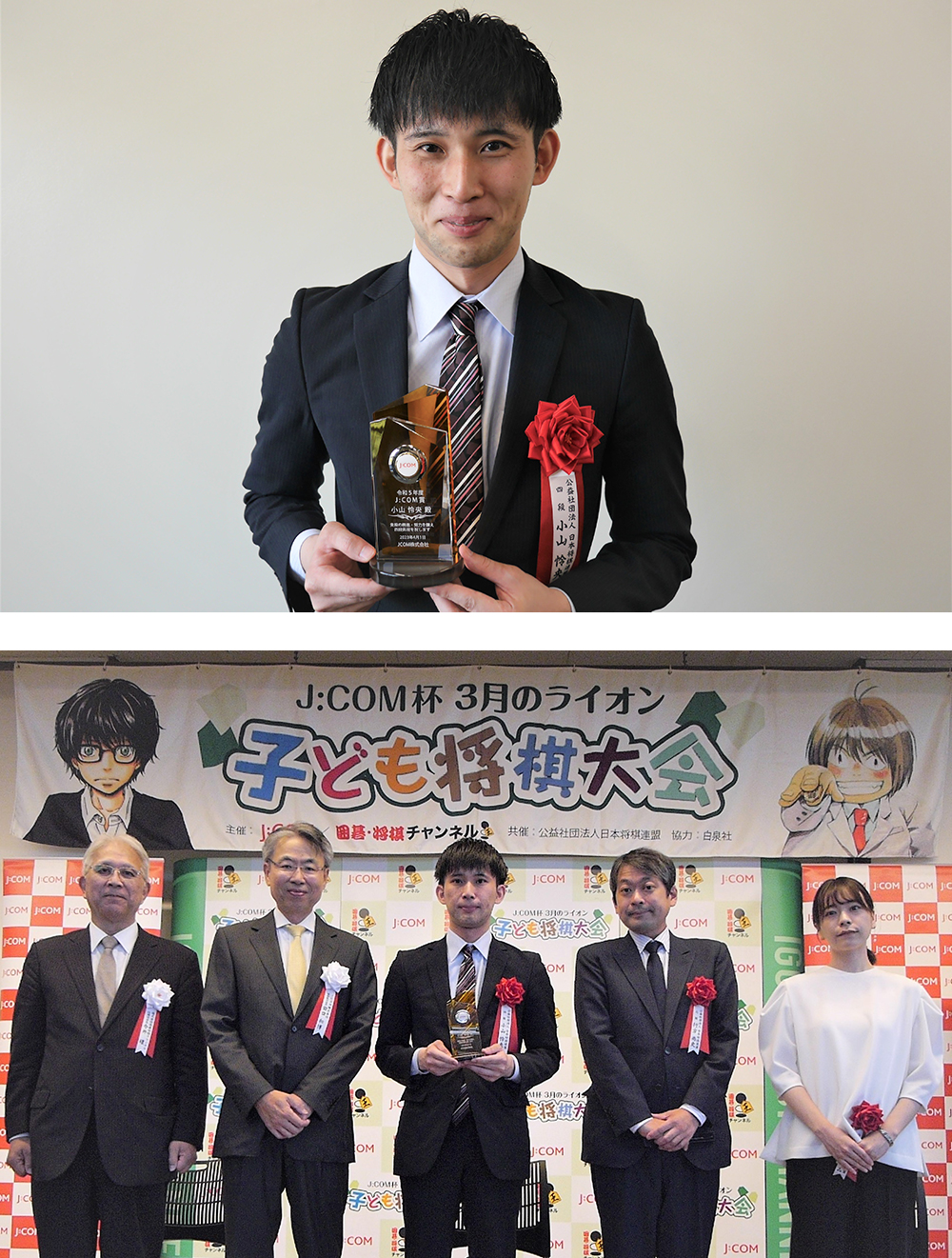
From the left, Go&Shogi Channel Mr. Imai, J:COM Taguchi, Leo Koyama 4th Dan, Naofumi Namekata 9th Dan, Kotomi Yamane Women's 2nd Dan
Award comment
I am very happy because I did not think that I would be eligible for the J:COM Award since I have not experienced Shoreikai.
The most memorable tournament from my childhood was the Junior High School Meijin Tournament, which I participated in in my third year of junior high school. We made it to the semi-finals and were in a good position, but we ended up losing in a big turn at the end. The regret I felt is a strong memory that I still look back on. I think that such experiences from childhood, including the J:COM Cup, will be remembered even as an adult.
After that, I tried the Shoreikai exam and the third-dan league transfer exam, but I failed at both, and there was a time when I thought I was done with shogi. My results in official matches were not good, and I wasn't paying attention to the transfer exam, but as I started to see wins, I realized that not only my grades, but also the possibility of ``deepening my shogi'' skills. , I decided to take the transfer exam seriously. For that reason, I felt that I needed more time to play shogi, so I made the drastic decision to quit my job. I started studying mainly AI, which I had wanted to do for a while, and tried out what I had learned about AI in face-to-face matches, making small adjustments and creating my own version of shogi.
Unlike previous exams, the transfer exam was special because if you passed it, you could instantly become a pro, but I wanted to approach it with the same mindset as any other game. I was under a lot of pressure when I lost most recently, but I was able to get through it by telling myself that it would only be tough for about a month.
This time, I won the prize at the Tohoku tournament, but when I was a high school student, I was struck by the Great East Japan Earthquake. think. Also, devoting myself to shogi gave me support, and I came to know the value of not taking everyday life for granted. As a shogi player, I would like to take this opportunity to share my experiences and hope that I can be of help to Tohoku in the future.
Mr. Namekata, who is the head referee of this tournament, has helped me a lot in important situations, such as taking a coaching match when I was in elementary school and meeting him at an event to recover from the earthquake. He was happy when I became a shogi player, and he always invited me to join a study group again.
Currently, I am a free class shogi player, so one of my big goals is to get out of there. For that reason, I feel that it is necessary to continue the effort that I have been working hard for the transfer exam. I have deep research into the beginning and middle stages of Toyoshima 9th Dan, and I admire shogi that shows stable moves even after my research fails.
In my third year of junior high school, I was rejected by Shoreikai, and I had to give up on my path to become a professional. However, I was able to continue playing shogi thanks to my love for shogi and participating in tournaments even after I entered high school.
Aiming to be a chess player is really hard. I think there are times when you get depressed when you lose, but if you like shogi and want to keep playing it, it will surely lead to good results. I want the children to try their best with that feeling.

From the left, Go&Shogi Channel Mr. Imai, J:COM Taguchi, Leo Koyama 4th Dan, Naofumi Namekata 9th Dan, Kotomi Yamane Women's 2nd Dan
2022 Presentation Ceremony
Nagisa Fujimoto 4th Dan
(January 21, 2023 72nd ALSOK Cup Osho Game 7th Game 2nd Game Takatsuki Game Inside the large panel commentary)
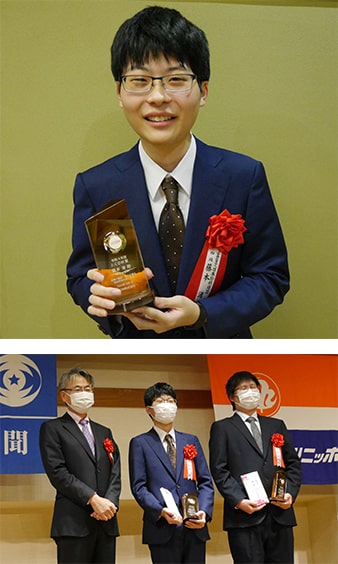
From left: J:COM Taguchi, Nagisa Fujimoto 4th Dan, Yuya Saito 4th Dan
Award comment
My parents were the reason I started playing shogi. My father only knew the rules, but on my 6th birthday (July 18th), I learned Shogi and started playing it. While I was doing my best, I was able to beat my father around autumn. My mother recommended me to go to a shogi class, and at first I was just frustrated when I lost. .
I took Shoreikai exam for the first time when I was in the 4th grade of elementary school, and I failed. It was a bitter experience to lose three times in a row in the first qualifying round. Based on that, I was able to pass when I was in the 5th grade of elementary school.
When I went to Kakogawa for a shogi class expedition, I remember being surprised at how high the level was. At that time, I met my current teacher, and I thought that I wanted to come here, and that if I went there, I could become stronger. Until I graduated from elementary school, I was allowed to commute from Takamatsu every time by car, and in junior high school I took the train myself.
After high school, my family moved to Osaka for Shoreikai. With this move, my father had to change jobs, and I thought I had to do my best to bear the expectations and determination of my family. I think my parents had a hard time, but I am happy and grateful that they gave me the chance to play shogi. At the first regular meeting after moving to Osaka, I was promoted to 2nd dan, and after 4 months I was promoted to 3rd dan. It was a surprise even for me.
I didn't think I'd be able to reach 4th dan so quickly, so I was dazed for a while. I think that the tournament will continue for a long time to come, so I feel that I have to study hard.
In the past, a 17-year-old might have been young to be a pro, but now there are people who are three years older than them and have absolute strength. For example, I think there are some shogi players who say they didn't get involved in the title because of Mr. Habu, but I feel that Mr. Fujii will also be like that. I have a sense of urgency that we have to do something about this situation, and I think it will be tough against opponents who are much stronger than me, but I think we have to close the gap little by little.
The target is Mr. Habu. In a good way, he has no special tactics, and he has the image of being strong at anything. I am very knowledgeable and respectful.
I want to tell children that it is important to look back in order to become stronger. Winning is important in shogi, but I feel that looking back on losses is also important in order to become stronger. Also, I want you to enjoy pointing.

From left: J:COM Taguchi, Nagisa Fujimoto 4th Dan, Yuya Saito 4th Dan
Yuya Saito 4th Dan
(2023/1/21 72nd ALSOK Cup Osho Match 7th Game 2nd Match Takatsuki Match Inside the large board commentary)
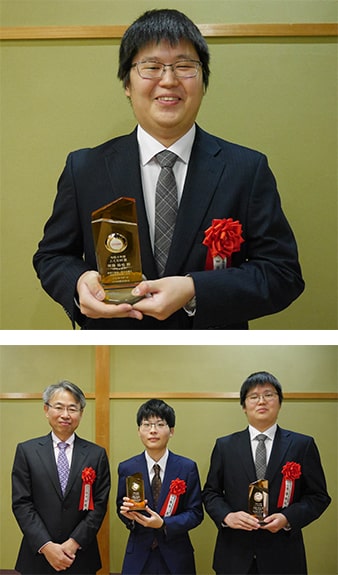
From left: J:COM Taguchi, Nagisa Fujimoto 4th Dan, Yuya Saito 4th Dan
Award comment
There are still people in the same age group as me and friends who have worked Shoreikai, so I am very grateful to be able to support them, including those people. Normally, there are many awards presented to those who have won the chess tournament and achieved results, but it is great for me, who had a hard time at the Encouragement Shoreikai, to see Shoreikai, which is hidden from the public eye. Thank you. I was lucky enough to become a professional, but even in the 3-dan league, the difference in ability is a fine line, and I feel that everyone is doing their best.
I had a hard time during Shoreikai, but there are parts that I think I was trying hard enough to say that. Maybe it was just that I was having a hard time because I didn't study. As I got older, there was a time when I felt that I might not be able to reach 4th Dan. When I was a 1st or 2nd dan, I was already competing at 3rd dan, and I had an inferiority complex. My master, Sugimoto 8th Dan, also knew that age was a tough one, and told me that I should do it until I was satisfied.
When I was in college, I lived alone, but I think that the environment was not suitable for me, such as balancing housework and schoolwork. When I came back to my parents' house after graduating from university, my parents told me that if I hadn't been promoted by this time, I would quit. I'm here. By setting a break, I was motivated to do my best until then, and from there I was able to concentrate. As a result, I was able to move up from 1st to 4th dan in two years, and I think it was the right choice to come back in a different environment.
I became a professional and the people around me were happy. I was surprised myself, but I think there were many times when I was surprised that I was out of the first term of the 3-dan league.
In the future, I would like to play an active role related to the title because I have become a professional player. My favorite teacher is Kazuki Kimura, 9th Dan. Like myself, he had a hard time during Shoreikai days, and in the midst of that he was able to win the title.
I live in a world of tournament, so there is a part of me that enjoys nothing but winning. However, I feel that how you feel when you lose and how you can enjoy yourself are the key to whether or not you can continue playing shogi. If you keep doing something, not just shogi, I think you will steadily become stronger. I feel that if I continue, I will find salvation unexpectedly.

From left: J:COM Taguchi, Nagisa Fujimoto 4th Dan, Yuya Saito 4th Dan
Leo Okabe 4th Dan
(September 11, 2022, in the Tohoku Children's Shogi Tournament)
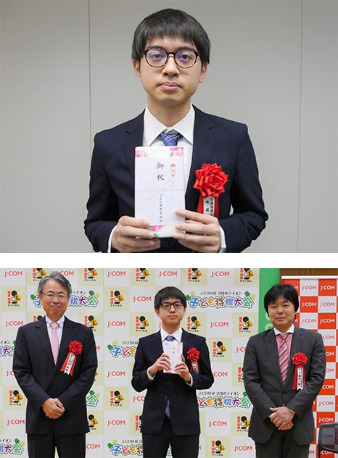
From left: J:COM Taguchi, Reo Okabe 4th Dan, Takeshi Fujii 9th Dan
Award comment
I started playing shogi when I saw my older brother and grandfather playing, and now I have fond memories of how I gradually became stronger at a local shogi class.
I joined Shoreikai at the age of 12, traveled three to four hours from Tsuruoka to Tokyo, played shogi, took a late-night bus back home, and went to school in the morning the next day. When I lost, it took me a longer way home than the people in Kanto, and I think I experienced more frustration than anyone else, but I think it gave me a positive feeling of "I'm going to do it." I progressed at a normal pace up to 3rd dan, but the five years after reaching 3rd dan were very tough. It was difficult to keep my motivation especially in league matches where there was no possibility of promotion.
My brother joined Shoreikai at the same time and withdrew first, but after moving to Tokyo, he lived with me and gave me his full support, including living support, to help me become a shogi player. I am grateful to my brother, and I thought that I also have to do my best. I think my brother is very happy that I became a shogi player.
After becoming a shogi player, I'm not winning as much as I'd like, so there's a part of me that gets impatient, but I'm able to win 70% of the time. I would like to be able to compete with the teachers who are shogi players. On September 22nd, there will be a match against Kana Satomi for the shogi transfer exam, and I think it will attract a lot of attention. I think. It's been a while since I became a shogi player, but I think it will be a good experience, so I want to do my best.
I usually go to the sauna the day before the match to get in shape. It's a relaxing hobby that increases your winning rate. Also, as a shogi player, I'm addicted to watching poker on YouTube. I use a different brain than shogi and take a break.
I think that if you want to become a shogi player, you should join Shoreikai, but in a tough world where you can't win as much as you think you can, the reason why I was able to continue even in the midst of all this is because I love shogi. increase. I hope that the children participating in this tournament will continue to do their best with the feeling that they love shogi.
Reference: September 12, 2022 Notice (348KB)

From left: J:COM Taguchi, Reo Okabe 4th Dan, Takeshi Fujii 9th Dan
Tokuda Kenshi 4th Dan
(September 25, 2022, in the Chugoku Children's Shogi Tournament)
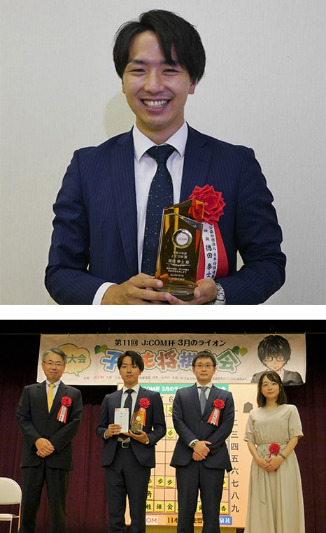
From the left, J:COM Taguchi, Kenshi Tokuda 4th Dan, Takayuki Yamasaki 8th Dan, Io Murota Women's 2nd Dan
Award comment
I started playing shogi because I saw my father and grandfather playing one game on the shogi board that was cleaned up at the end of the year, and I thought I'd give it a try. They don't usually play shogi at all, so it was really a coincidence. When I was an elementary school student, I remember losing in a big tournament, even a national one, which was very frustrating, and I wanted to win the tournament, so I continued playing shogi. At Shoreikai, there were two times when I stopped at the same dan for 3 or 4 years, and there was a period when I was mentally tough when I was at 2nd dan. I thought that it would be difficult to become a professional if I stopped here for many years, even though there was an even tougher 3rd dan waiting ahead. However, the people around me were not as pessimistic as I thought. Around that time, my environment changed as I went on to college, and I was able to enjoy my daily life, and I was able to overcome the difficult times.
At university, I spent my time in various circles, such as volunteering and scuba diving, while experiencing things other than shogi. After graduating from university, I saw the people around me struggling as members of society, and I felt like I was the only one who was stagnant. Everyone was doing their best, so I had to do my best too. By being promoted to 4th Dan, I felt that I had finally become a full-fledged professional, and by finding a job as a professional shogi player, my self-esteem increased.
Also, recently, I have been attracting attention as the first opponent of the Satomi Women's Five Crown shogi player transfer exam, and although I am not the main character, I felt that being able to play such a game is a shogi player's happiness. I was able to challenge the official game with high motivation until just before that, so that I could take my top to the game and challenge with good results. It was a tough match on the day of the exam, but I managed to win, and as an examiner, I wanted to focus on the results, so I feel that I was able to fulfill my responsibilities.
In the future, I want to win titles. Now that I've become a shogi player, I feel like I want to aim, and no matter how difficult it is, I want to challenge myself to the limit. In the near future, there will be the final match of the young players' tournament (Kakogawa Seiryu match), so I would like to do my best for that.
I want children to enjoy playing shogi. I feel that it is the most important thing, not just shogi. It would make me happy if people started to like shogi more because of this tournament.

From the left, J:COM Taguchi, Kenshi Tokuda 4th Dan, Takayuki Yamasaki 8th Dan, Io Murota Women's 2nd Dan
2021 Presentation Ceremony
Akihiro Takada 4th Dan
(October 30, 2021, in the Tokai Children's Shogi Tournament)
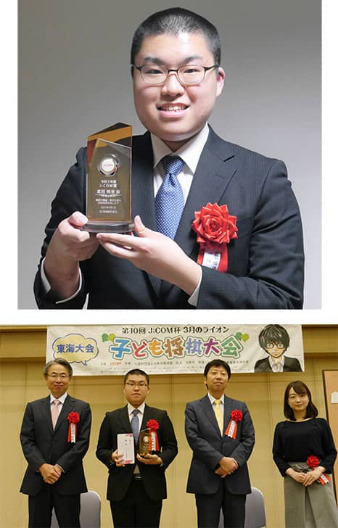
From left: J:COM Taguchi, Akihiro Takada 4th Dan, Masataka Sugimoto 8th Dan, Io Murota Female 2nd Dan
Award comment
I participated in the 3rd Chiba tournament, and even though I had decided to join Shoreikai, I was still unsure if I would be able to become a shogi player. I feel very honored to be able to receive such an award now that I am a professional Shogi player.
When I was an amateur, I participated in many tournaments. I think there are many tournaments for elementary and junior high school students, including J:COM Cup, and the best way to improve is to participate in many such tournaments, study hard at home by playing online Shogi, and Tsume Shogi, for which there are many books. I think it will be a step.
At Shoreikai, I didn't have many research partners because I live in a rural area, but I was encouraged by the support of my fellow Shoreikai and amateurs in the Tokai region. I feel that I was able to become a shogi player. I was able to achieve my biggest goal of becoming a professional shogi player. We will continue to work hard with a sense of crisis.
A Shogi player I respect is Fujii Triple Crown. I feel that his responses in interviews and the way he approaches shogi are wonderful, and I hope that I can become stronger by emulating the attitude of Fujii Triple Crown. I have been a member of the same study group as Mr. Fujii since I joined Shoreikai in the 6th grade, and we have played 4 to 50 games so far. When I was in elementary school or the first year of junior high school, I fondly remember thinking of Mr. Fujii as my "rival" and trying my best to point at him.
I started playing shogi when I was in the third grade of elementary school, but I think some of the people participating in this tournament are younger, as well as older people and people who started playing shogi a little later. For those who say so, there are now online shogi and shogi software, so I hope they don't give up on their dream of becoming a professional and do their best.
Reference: November 1, 2021 Notice (395KB)

From left: J:COM Taguchi, Akihiro Takada 4th Dan, Masataka Sugimoto 8th Dan, Io Murota Female 2nd Dan
Akihiro Ida 4th Dan
(2021/11/23 in the Kansai Children's Shogi Tournament)
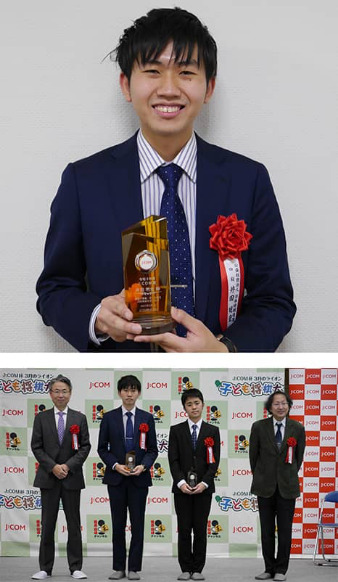
From left: J:COM Taguchi, Akihiro Ida 4th dan, Yuki Yokoyama 4th dan, Bungo Fukusaki 9th dan
Award comment
I feel very honored because it is rare to receive an award like this.
I learned shogi when I was living in Yamaguchi Prefecture, but there weren't many people playing shogi and I didn't have many opportunities to experience shogi, so I used to participate in tournaments in Hiroshima and Osaka.
I think that the shogi tournament is the place where children can become the strongest. Recently, due to the corona misfortune, there are no more opportunities to practice shogi face-to-face. I myself can't do the exercises I usually do, and sometimes I don't feel well. Even though we live in an era where we can play shogi online, I think that being able to play shogi face-to-face is an important opportunity that will benefit us in some way.
My life in Shoreikai was far from smooth. I was too young to be a member of Shoreikai, and I was promoted at an average speed. However, I couldn't think of a career other than shogi, so I always thought that even if the possibility was low, I had no choice but to work hard to become a shogi player.
While I was enrolled in the Shoreikai Shoreikai, I didn't have any financial leeway or a title. I feel that
As a shogi player, I would like many people to see shogi in the future. For that, I feel that I have to win a lot. I will do my best to aim for a 70% win rate. Also, one of my goals is to become a leader in my favorite tactics, just like Kanto's 4th dan Yamamoto has a deep love for tactics for three-way rooks.
I would like to tell children who want to become shogi players that it is important to enjoy playing shogi. There are things in your studies that you don't want to do, and there will be times when you lose and feel like running away. But at times like that, if you enjoy playing shogi itself, you can continue without difficulty, and if you do so, I think you will surely be able to achieve your goal of becoming a shogi player.

From left: J:COM Taguchi, Akihiro Ida 4th dan, Yuki Yokoyama 4th dan, Bungo Fukusaki 9th dan
Yuki Yokoyama 4th Dan
(2021/11/23 in the Kansai Children's Shogi Tournament)
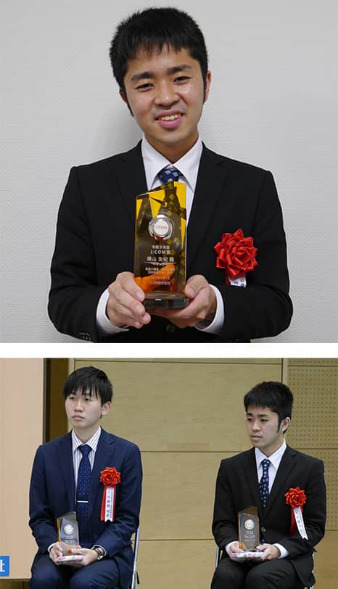
Award comment
Actually, I was surprised and happy because I was participating in the first local competition.
I myself learned shogi at after-school daycare, when I was in the lower grades. From there, I went to Mr. Inoue's class until I was about 6th grade. When I was in elementary school, I started to imitate Hirose-sensei, and I continued to use the same tactics from 5th Shoreikai to 3rd dan. When I look back on the time when I was in Shoreikai, I remember my high school days when I was sluggish. When I was in high school, I had a hard time thinking that shogi was the only one for me, but since I became a university student, I have broadened my horizons through various experiences and feel that I have been able to receive positive influences other than shogi. Around that time, my tactics changed, and I began to admire Mr. Takeshi Fujii.
When I look at the children participating in this tournament, it is impressive that they point to the latest kata, and the tactics that were used in my generation have become less common.
There is a seriousness that you wouldn't expect from a child, and I felt that there are more children who are enthusiastic about shogi than in our time. I hope that you will continue to do your best in the future with the same enthusiasm.
My future goal is to enjoy Shogi even more and to become a polite person like my teacher, Inoue sensei.

Mikio Kariyama 4th Dan
(2021/12/2 Kansai Shogi Hall)
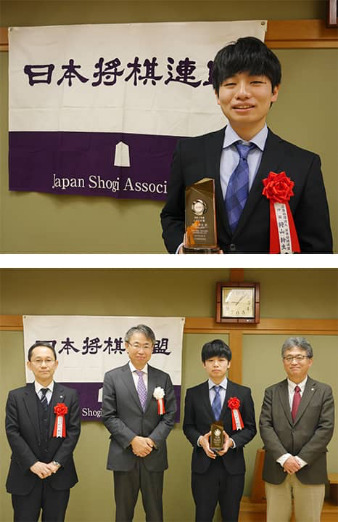
Award comment
I feel very honored to be a shogi player and receive such an award. Actually, I also participated in the Kansai tournament in Osaka when I was in the 4th and 5th grade of elementary school. That experience was one of the reasons I wanted to become a professional shogi player, so I am deeply moved to receive such an award. From now on, I would like to do my best so that I can wear the suit I received at the top.
At first, my grandfather taught me how to play shogi. After that, I played online for about a year, and when I was in the second grade of elementary school, I played against a child of the same age for the first time. At first, I had a hard time winning, but after I started going to class, I was able to win, and I remember enjoying Shogi.
I was enrolled in Shoreikai for seven years, but looking back, I feel that there were many difficult times.
Even so, the teachers in Kurashiki congratulated me every time I was promoted, which encouraged me to do my best.
I was on good terms with Fujii Shikaku, who was in the same age as me, in the Tokai region, and sometimes talked with him before Shoreikai. I also remember staying with Takada-kun (Akihiro Takada, 4th dan) at the Shoreikai Hall when Fujii was a 5th or 6th dan. Although he is above the clouds, I thought he was a kind person who treated me kindly. I myself support Fujii's four crowns, and at the same time, I feel that they are the existence of goals.
As for my future aspirations, first of all, I would like to improve myself and play good shogi in my upcoming debut match. The target shogi player is Mr. Sugai, who is also from Okayama Prefecture. Of course, he is good at shogi, but Mr. Sugai has lived in his hometown for a long time, and even though he is busy, he takes care of his fans. I feel that I want to emulate such places and make them my goals. From now on, I want to do my best without forgetting the feeling of the time of Shoreikai.
I think children become stronger because they love shogi, so I want them to like shogi first. Also, to be strong, you need the cooperation of your parents. I think that being grateful to your parents and people around you is one of the reasons for your strength, so I want you to take care of that part as well.

- Corporate information top
- Sustainability
- Contribution to sustainable regional development
- Supporting challenges in culture and sports
- J:COM Cup Children's Shogi Tournament
- Support for Shoreikai and creation of the “J:COM Award”




